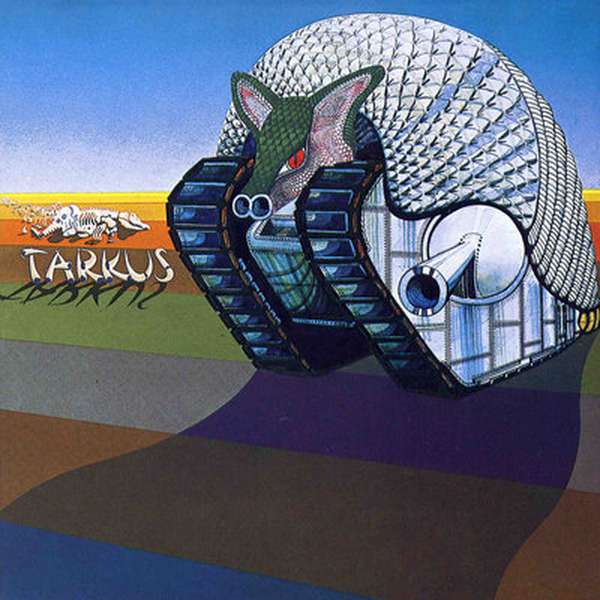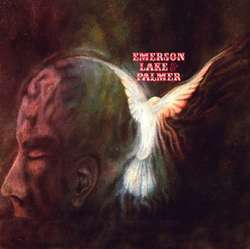Emerson, Lake & Palmer, in addition to being amongst the first and most recognizable supergroups ever, have somewhat of a divided reputation. Either they're the ultimate expression of talented rock musicianship, each member being an established virtuoso musician in his own right, or they're the posterchildren for everything that there is to hate about progressive rock, creating music that can be excessively grandiose and inaccessibly obtuse. Whatever your feelings on their music, however, their influence on modern rock music cannot be denied, which makes Razor & Tie's new reissue series all the more welcome. Featuring only the cream of ELP's discography (no, you won't have to suffer through In the Hot Seat again), the series offers a chance to revisit some of the most controversial music of the seventies from a modern perspective, and there's no doubt that Tarkus of all albums deserves the title of “controversial”.
I don't want to rag too hard on the original album, not in the least because many progheads hold it in high regard, but to be frank, Tarkus was never an impressive album to me. The title track always seemed to be flat and uninteresting, spending all of its time dancing around what could've been an amazing concept for a song and generating very little of actual worth. Interesting themes and ideas are explored for but a minute before they're suddenly choked off to make room for what comes next, and the entire piece lacks the dynamic structure to keep it flowing as quickly as it wants to. It felt like a cacophonous medley of half-related suggestions rather than a finely-tuned construct, paling in comparison to truly great side-long epics like "2112", "Supper's Ready", "Close to the Edge", and "Echoes". To boot, almost all of the short pieces on the latter half of the album felt like half-assed, rushed ideas for songs that lack the creative spark these musicians clearly had. It's not that I'd consider these musicians anything less than virtuosos; it's just that this album seemed to have been produced in an otherwise inexplicable creative lull. This is all not to mention that it was originally released in 1971, making it contemporaneous with great progressive albums like Nursery Cryme, Meddle, The Low Spark of High Heeled Boys, Aqualung, and the legendary Fragile.
Even looking back now, not much has changed over time with my impressions of the source material, and I am still as incredibly underwhelmed with the album as I was before. Listening to the remastered original mix on the first disc and the stereo mix on the second really doesn't offer much in the way of fresh revelations. The title track still feels like an unplanned amalgamation of disjoint pieces without any real collective merit, and the latter tracks still fail in their search for relevance on this album. That being said, purists who enjoyed the original album will find this pair of mixes a welcome inclusion, if only for historic value (or scratching that completionist itch).
The second disc with the new stereo mix also includes a selection of bonus tracks which, as a whole, aren't that bad (as far as bonus material goes). The first two selections are studio outtakes that didn't make it to the album, beginning with a soft-rock song titled “Oh, My Father”. This soft piece is actually quite moving and its lyrics disarmingly frank, evidently written about the passing of Lake's father. This track is unusually strong, especially for bonus material, and it's surprising it was left off of the album at the time—it's clearly better than anything else that made the final cut. There's also an untitled Emerson piece discovered on the tapes which is much more sketchy. It's clearly a work in progress, built on a very simple ballad structure and with honestly terrible and uninspired lyrics. At least in comparison to the prior track, it was easy to see why this song didn't amount to anything. Finally, there's an alternate version of the section “Mass” from “Tarkus”. Since the entire thing was an improvised solo (which therefore changed from take to take), it is rather interesting to hear what Emerson felt was at the core of the piece, as well as what changed and stayed the same between takes. It's really something that the dedicated fans will enjoy most, but nearly everyone can appreciate an exceptionally capable keyboard performance.
The third disc is where the true appeal of this collection lies: it contains two new mixes of the album by the incredibly busy and always-impressive Steven Wilson (frontman of Porcupine Tree, mixing artist for every 1970s progressive rock reissue this decade). The hi-res stereo mixes are, predictably, just the exact same audio as disc two, and the 5.1 mix is of the original album and “Oh, My Father”. Here's the problem: as I've just discussed, none of the music here is particularly enjoyable, and no matter how great these mixes are (the 5.1 in particular), it can't change the fact that listening to them in the first place isn't that enjoyable. Wilson has done a great job working with what he has, but the truth is that even he can't compensate for a lack of good material to start with.
Here's the bottom line: a lot of progressive rock purists sing praises of this album to the high heavens, and this reissue is clearly designed for them. Those are the people who are going to see the vast wealth of material here and be able to appreciate its worth. However, folks like myself who were rather unimpressed with this album the first time around won't find any fresh insights to make it worth it. It's not so terrible that I'd call it a completionists-only release, but the majority of progressive rock fans can safely skip this one.


